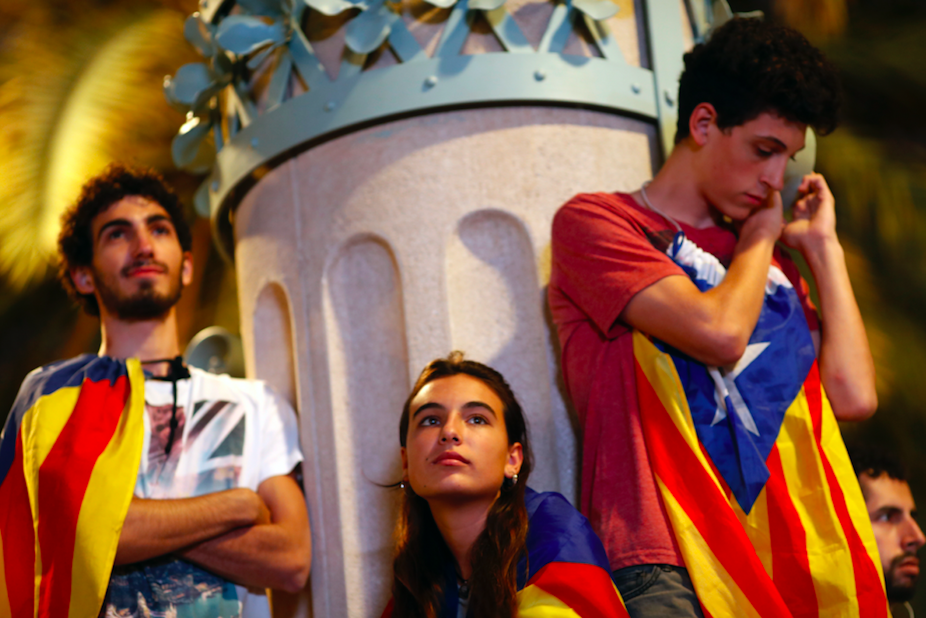Spanish president Mariano Rajoy is calling for clarification from the government of Catalonia over whether it is or isn’t declaring independence in the wake of a disputed referendum on October 1. The two administrations are locked in impasse. So where do we go from here?
Catalan leader Carles Puigdemont says he has a mandate to push forward with independence but will not do so immediately. What does this mean in practice?
Most significantly, it means that Puigdemont has stepped back from the brink by not pressing ahead with an unambiguous unilateral declaration of independence. He has bought some breathing space to engage in dialogue within the pro-independence camp, leaving open the possibility of talks with the Spanish government.
Puigdemont will now be under intense pressure from his pro-independence partners, most notably the anti-capitalist CUP (Popular Unity Candidacy), and to a lesser extent, ERC (Republican Left of Catalonia) to stick to his guns and unambiguously opt for a unilateral declaration of independence.
Spanish leader Mariano Rajoy has indicated that he is prepared to impose direct rule unless Puigdemont “respects the rule of law”. What does he mean?
I believe it means engaging in the kind of dialogue which has been almost entirely absent over recent years. As far as the Spanish government is concerned, independence is out of the question. It remains to be seen whether there might be the possibility of a revision to the Catalan Statute, or even an amendment to the constitution itself so as to facilitate Catalonia remaining within Spain, with the possibility of there being an official referendum on Catalonia’s status within Spain at some indeterminate point in the future. Whether this is realistic depends largely on Puigdemont’s capacity to resist the more extreme voices within the pro-independence camp whose strategy appears to be one of upping the ante and pushing both sides into further confrontation.
Rajoy says he remains prepared to invoke Article 155 of the constitution. What would happen then?
Spain would essentially take whatever steps are necessary to ensure that the Catalan authorities comply with their legal obligations in accordance with the Spanish constitution. It would mean that Catalan regional institutions fall under the control of Madrid. This is a serious step as it would force Catalans into making a decision as to which side they are on: Madrid or Catalonia. It’s likely that Madrid would also dissolve the Catalan regional assembly and call fresh regional elections.

Article 155 should be viewed as the nuclear option, though. Rajoy will hope that threatening to use it will be enough to persuade Puigdemont to take a decisive step back. He will now wait for Puigdemont’s response.
What does “no deal” look like for Catalonia?
If Puigdemont insists on pressing on with independence, I fear Article 155 will be implemented and there will be a ratcheting up of an already explosive situation.
Independence will have to be removed from the agenda. That said, Madrid can choose to respond to Catalan demands without having to agree to outright independence.
Is there any way to resolve this situation that could placate both sides?
Incredibly, both sides have been guilty of rejecting dialogue, which is, after all, the only way to resolve the situation. This would require flexibility and compromise from both sides. The rapid advance towards confrontation must be reversed; time must be given to enable negotiations to take place. It may not be possible to find a solution that entirely satisfies either side, but one which both sides find at least acceptable is. The 1978 Spanish constitution is proof that this can be done. By no means perfect, the Constitution was acceptable to people of practically every shade of opinion.
What is the current state of popular opinion on this issue?
People in Catalonia and throughout the rest of Spain are aghast that tensions have risen to crisis point in this manner. There is a feeling of real concern at the escalation of events over recent weeks, with a fear that the more extreme viewpoints on both sides have sidelined moderate voices advocating compromise and dialogue.

